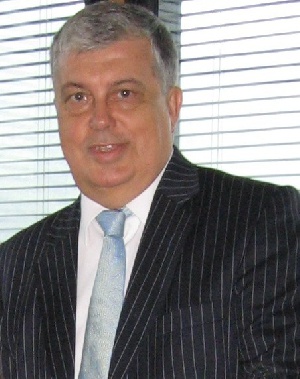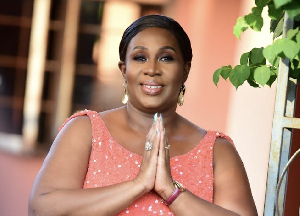By Kester Kenn Klomegah
Russia's LUKOIL is one of the world's biggest vertically integrated companies for production of crude oil & gas, and their refining into petroleum products and petrochemicals. The company is a leader on Russian and international markets in its core business and its key mission is to harness natural energy resources for human benefit and supports long-term economic growth, social stability, prosperity and progress in the regions where it operates.
Pavel Bogomolov, Government & Public Relations Manager of LUKOIL Overseas Ghana Ltd, speaks to Kester Kenn Klomegah from BuzinessafricaDotCom about operations of LUKOIL in Ghana, and plans to expand business operations to other African countries such as Cote d'Ivoire and Sierra Leone.
Interview Excerpts:
Buziness Africa: What are LUKOIL's priorities in Africa and what is the level of LUKOIL company's involvement in the economy of Africa?
Pavel Bogomolov: However modest our priorities may seem at the moment, LUKOIL's current plans for 2011-2012 are strictly focused on attempt to carry out exploration and subsequently, the appraisal of our 3 offshore blocks in Cote d'Ivoire, 1 block in Ghana and, in the near future, yet another block in Sierra Leone that has been acquired. All this does not exclude the probability of some additional acquisitions of upstream projects in the waters of other west African states. LUKOIL Overseas will resume active operations under the CI-205 project as soon as the situation in Cote d'Ivoire subsides.
But, once again, we would draw the attention to the fact that, geographically, LUKOIL's expansion is now still limited to the Gulf of Guinea, although we also demonstrate some interest in those remote opportunities that are on offer in other parts of Africa. Taking the above into account, we would say that the level of our company's involvement in the economy of the region is not so high yet, and quite understandably so.
Usually, it is only after the establishment of some commercial reserves of crude that the oil majors decide on the continuation of their business presence in the corresponding countries. This brings about some increasing volumes of the companies' multi-faceted involvement in the local economy as a whole. Certainly, we have not yet reached such a determining point of our investment programme in west Africa so far.
BA: What difficulties LUKOIL faces on the continent? Do you also think that some government policies pose some problems to the smooth operations of your company in Africa?
PB: Until now, the only real difficulty LUKOIL has faced on the African continent, was the recent constitutional crisis and armed conflict in Cote d'Ivoire. Those lamentable events temporarily paralyzed foreign investment in that country. But otherwise, we do not truly believe that, in general terms, African leadership and government policies pose some serious problems to our operations in the region.
We are also hopeful that, although some clauses of the forthcoming Ghanaian law on local content and local participation in the oil & gas sector might impose some stricter obligations on foreign investors, but this legislation as a whole will be, of course, motivated by common sense, good reason, mutual respect, and the traditional business-friendliness of Ghana.
BA: What kinds of competition do you face from related companies (both local or foreign) in similar oil exploration and extraction, as well as refining spheres in Africa?
PB: As regards the refining sector mentioned by your good self, we would like to specify that, for the time being, LUKOIL is not planning any involvement in refining or other spheres of downstream in West Africa. Therefore, it is only upstream activities where your question about competition might sound relevant to us, but only in theory. Because in practice, we do not face any true competition from any rivals, let them be local or western.
Quite to the contrary, the Accra-based Exploration & Production forum, while uniting all upstream investors in Ghana, serves our joint interests. The forum puts forward to the government and the parliament of this country our common concerns and proposals. At the same time, some individual peculiarities of "concrete" investment projects offshore are strictly limited to the boundaries of the corresponding blocks. So, as a rule, they do not provoke any inter-corporate contradictions. However, your question might acquire more validity in the future when the waters of the Gulf of Guinea will become a lot more "overcrowded" and some controversies about the best possible export schemes and most profitable routes would possibly emerge.
BA: In future, would LUKOIL like to redefine or diversify its priorities there? And in what directions?
PB: Such a redefinition or diversification of our priorities, although not guaranteed 100%, might hypothetically happen as a result of our appraisal programme offshore. And, of course, these steps would not be made unilaterally, but together with our partners including such national petroleum companies as GNPC and PETROCI, as well as the American shareholder of some of our joint projects, i.e. Vanco. LUKOIL's senior management has emphasized on more than one occasion that, if the quantity of the reserves to be evaluated on our blocks, proves to be sufficient for their industrial development and exports, - some intensifying and broadening of this regional programme would become likely to consider.
BA: What additional useful information would you like to give to policy makers, politicians and oil business executives in Africa?
PB: We believe that, apart from our direct investment (which only in Ghana, on the eve of the arrival of the purposefully rented "sixth generation" drilling ship called Olympia in May 2011, had already totaled $200 million dollars), there are also some additional advantages of a dialogue with LUKOIL. Such benefits are worth appreciation and use by African policy makers and business people. This is all primarily about LUKOIL's high professional and ethical stance in the national and global entrepreneurial community.
Indeed, our energy giant, while celebrating its 20th anniversary this year, attributes a huge deal of importance to the so-called "oil diplomacy" in the best sense of this formula. It is precisely LUKOIL who gives Africans the widest access and introduction to the modern business world of Russia. For instance, last year our company became the organizer, sponsor and the key partner to the biggest ever African public gathering at Moscow's Radisson Hotel where the first Russia-African Inter-parliamentary and Business forum were successfully held.
Equally, it is LUKOIL who presents African arts, including the brilliant Noyam folkloric dance ensemble, to our fellow-citizens. We are also launching a highly-promising programme of multi-year bachelor & master degree studies for competitively selected Ghanaian students at the Moscow State University of Oil and Gas named after I.M.Gubkin in such faculties as, for example, petroleum geology, field development, etc.
Those aspiring for their master degree will have to spend 3 years in Russia, while those (after their pre-university schools) having to graduate, first of all, as bachelors, will probably study for 4-5 years. The advantage of this programme is that LUKOIL will take care of their pre-diploma practice on the Russian oilfields and, after that, their post-university employment with LUKOIL's West African projects. In the corresponding Memorandum on this issue, signed in Moscow by LUKOIL's President Vagit Alekperov and the Minister of Energy of the Republic of Ghana, Dr Joseph Oteng Adjey, on the 4th October 2010.
Next year, probably, we might be able to share our vision of certain directives for our humanitarian cooperation in some other countries of the Gulf of Guinea area, for example, Sierra Leone. And, finally, LUKOIL uses every single opportunity to take African colleagues to our oil rigs in the Caspian Sea for their profound acquaintance with our "zero-contamination" technologies. While judging all these, and you will unavoidably come to the conclusion that the pioneer of the Russian vertically-integrated petroleum business really contributes to this starting period of Russian-African "cooperation's renaissance" somewhat more than just project investment.
Business News of Wednesday, 19 October 2011
Source: buzinessafrica.com/" rel="nofollow noopener" target="_blank">buzinessafrica.com
Russia: Lukoil Explores Africa's West Coast
Opinions












